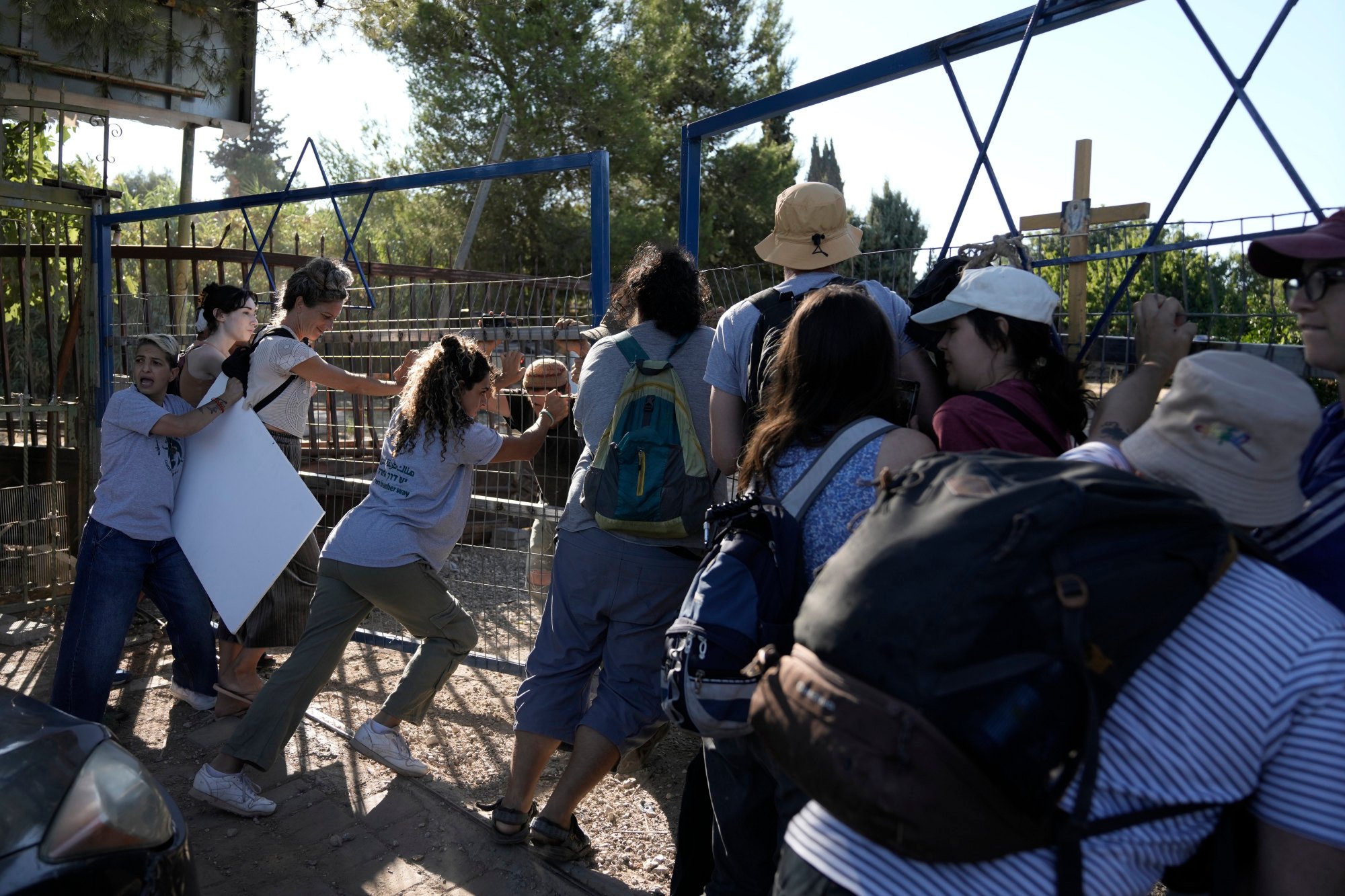
WEST BANK ANTI-EVICTION ENCAMPMENT RALLIES PALESTINIANS, ISRAELI ALLIES
- Some activists point out that despite the energy in the encampment, the Israeli government appears set on expanding settlement activity
Flanked by smartphone-wielding peace activists, members of an evicted Palestinian family marched onto land seized by armed Israeli settlers, shouting "Out! Out!" as they live-streamed the confrontation on Instagram.
After Israeli security forces turned them away, they retreated to their makeshift base: a fast-growing tented encampment for supporters of the family - the Kisiyas - that has spotlighted their plight amid widening settler attacks in the Israeli-occupied West Bank.
Violence in the West Bank has surged alongside the war in Gaza, with at least 640 Palestinians killed by Israeli troops and settlers since Hamas's October 7 attack, according to a tally by journalists based on Palestinian health ministry figures.
Do you have questions about the biggest topics and trends from around the world? Get the answers with SCMP Knowledge, our new platform of curated content with explainers, FAQs, analyses and infographics brought to you by our award-winning team.
At least 19 Israelis have also died in Palestinian attacks during the same period, according to Israeli officials.
Yet weeks of demonstrations at the tent near the Kisiyas' home in Beit Jala, south of Jerusalem, have made their story stand out, attracting anti-settlement activists, lawmakers, rabbis and Palestinians from other communities facing similar incursions.
The daily gatherings feature meals, prayer, singalongs, and lessons on non-violent resistance, usually followed by a caravan to the contested site to demand that the settlers leave.
During one such encounter on Thursday, Kisiya family members grabbed whatever they could - mattresses, electrical cables, fruit from a pomegranate tree - while activists tried to tear down settler-erected fences.
It is the kind of show of solidarity that was once more common but has become vanishingly rare during the war, organisers said.
"We will stay here until we get back our land," 30-year-old Alice Kisiya told journalists.
The settlers "took advantage of the war. They thought it would end in silence, but it didn't".
Some details of the Kisiyas' story have helped turn it into a rallying cry.
They are one of the area's few Christian families, and the land's stepped agricultural terraces sit in one of its few accessible green spaces.
Yet Knesset member Aida Touma-Suleiman told journalists that while the mobilisation around their struggle might be unusual, the challenges the Kisiyas face are common.
"I wish we can be able to stand near each family like this, but maybe this can be an example to show the world what is happening," she said.
Earlier this month, Israel's far-right Finance Minister Bezalel Smotrich announced the approval of a new settlement in the same area of the Kisiya encampment that the United Nations says would encroach on the Unesco World Heritage site of Battir.
The news drew international outcry, with Washington and the United Nations saying the settlement known as Nahal Heletz would jeopardise the viability of a Palestinian state.
All of Israel's settlements in the West Bank, occupied since 1967, are considered illegal under international law, regardless of whether they have Israeli planning permission.
The Kisiyas have for years been threatened by settlement activity, and in 2019 the civil administration demolished the family's home and restaurant.
The latest run-in occurred on July 31, when settlers from a nearby outpost accompanied by soldiers "raided the land, assaulting members of the Kisiya family and activists trying to force them to leave the area", according to Israeli anti-settlement group Peace Now.
The Kisiyas joined with activists to form the encampment just over a week later, although it got off to a slow start.
"I wish there was a camera when we first started. We were just sitting with chairs, had nothing in here. And we were discussing, like, 'What are we doing?'" said Palestinian activist Mai Shahin of Combatants for Peace.
"The first week was really hard with people calling like, 'What do you mean, is it dangerous?'"
As it has grown in size, Palestinians from elsewhere have come to see the encampment as a safe space.
"I have a lot of trauma from wearing my own keffiyeh (scarf) and wearing my identity for everyone to see," said Amira Mohammed, 25, of Jerusalem.
In the encampment "we were able to actually be ourselves, wear our keffiyehs, sing our songs in our language with our Israeli counterparts".
But some activists point out that despite the energy in the encampment, the current Israeli government appears set on expanding settlement activity.
"No anti-Israeli and anti-Zionist decision will stop the development of settlements," Smotrich, who himself lives in a settlement, posted on X this month.
"We will continue to fight against the dangerous project of creating a Palestinian state by creating facts on the ground."
Activist Talya Hirsch said such statements leave her with "no hope for this land" and "no vision of a better future".
She added: "But I don't move from this place. I have no hope but I have a high sense of responsibility."
More Articles from SCMP
All aboard the retro express: vintage MTR train delights 1,400 railway fans in Hong Kong
Hong Kong home store chain Pricerite and Tom Lee Music shut branches
Love and marriage: China’s Dali Bai region pledges to help its 33,000 bachelors find wives
Paris Paralympics: Hong Kong pair ‘honoured’ to carry city’s flag at opening ceremony
This article originally appeared on the South China Morning Post (www.scmp.com), the leading news media reporting on China and Asia.
Copyright (c) 2024. South China Morning Post Publishers Ltd. All rights reserved.
2024-08-24T15:40:27Z dg43tfdfdgfd